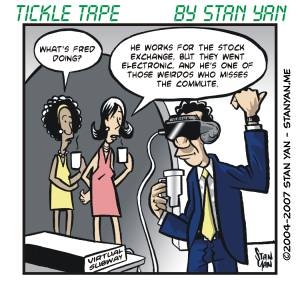Trading demands decisive action. Executing a successful trading plan often requires that one make a quick decision when optimal market conditions present themselves. But it is often hard to make such decisions when your money is on the line. There’s a natural inclination to avoid risk. Novice traders often deal with this fear of loss by over-thinking and over-analysis. They may tediously study indicator after indicator, even though many are redundant and converge. They may irrationally believe they have missed something. Although understandable, this kind of decision-making often leads to trading errors. It isn’t necessary to over-think and over-analyze. It is more useful to decisively execute a trade and move on.
Careful analysis of all possible alternatives and all possible consequences of one’s decisions is the hallmark of good decision-making. It is prudent in all financial decisions, and it’s important for trading as well. It’s important to avoid impulsive decisions where one takes unnecessary risks.
It’s vital to have a clearly defined trading plan, for example. Clearly define the signs and signals that indicate your trading plan has gone awry, suggesting that you should close out the trade to protect your capital. It is also important to manage risk. Make sure that a single trade doesn’t have the potential to completely wipe out your trading account. It may be useful to conduct a thorough analysis before making a decision, but it isn’t useful to become completely paralyzed by it.
Traders who have trouble acting decisively have an ardent need to seek out certainty and security. Uncertainty often represents insecurity. It’s not merely that they have a pessimistic outlook, although they have one. They equate money with psychological security; losing money represents not only a loss of financial security but also a loss of basic emotional security and well being.
These feelings are natural and understandable. Money does provide security, and so, if you are risking money you can’t afford to lose on a trade, it will be hard to shake this feeling. The best remedy is to trade money you can afford to lose and to manage risk. The other remedy is to learn about and use reliable trading strategies. In the end, all you can do is to just try to do your best. You can’t trade like a seasoned professional overnight.
Trading requires that you gain experience with different methods and trade under various market conditions. Over time, you’ll develop the skills of a seasoned trader; you’ll develop an intuitive feel for the markets. This will take time and effort, but it won’t happen if you avoid making trades because you are afraid. Just like any skill, it takes practice. You must practice, make mistakes, face setbacks, and recover from them. Hesitating out of fear will not allow you to develop these necessary skills.
In the end, becoming a seasoned trader requires taking risks. Putting your money on the line is hard to do, especially for a novice trader who knows he or she is likely to lose it. That’s why it is vital to control risk and trade with a detailed trading plan. It won’t prevent losses, but it will minimize them. If you can continue to practice trading, you’ll survive the learning curve and be one of the rare few who become winning traders.


